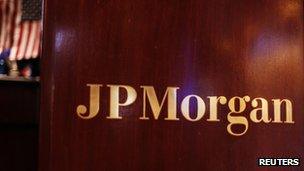JPMorgan’s loss may cost all banks
- Published
- comments

The loss at JPMorgan could have far-reaching consequences
JPMorgan has a reputation for being one of the better managed and more cautious of the world's huge banks.
But that reputation has taken a serious knock with the disclosure last night that a trading desk in London has lost $2bn - and perhaps more - on deals in what are known as corporate credit derivatives, or insurance against the danger of loans to companies going bad.
I am not sure it helps that the bank's chief executive, Jamie Dimon, has been refreshingly frank, blaming "errors, sloppiness and bad judgement".
Strikingly, he has not said that these transactions, carried out for JPMorgan's own benefit (or disbenefit, as it turns out) through its chief investment office, were unauthorised or down to a putative "rogue trader".
These deals were supposed to be a so-called hedge, an attempt to reduce the risks taken by the bank. That is why the incident is more than a big embarrassment for JPMorgan, although - for the avoidance of doubt - it will put a dent in the bank's profits for 2012 but won't anywhere near eliminate them.
It is the surprise factor - the shock evinced by Mr Dimon - that will reignite the debate about whether regulators need to take more decisive action to curb the complexity of investment banks, to better prevent this kind of accident.
Apart from anything else, Bloomberg and the Wall Street Journal both highlighted the big credit-derivative positions being taken by JPMorgan in London a few weeks ago, and the bank rejected the suggestion that there were serious dangers here.
So the JPMorgan trading loss will resonate and reverberate.
In the US, it will strengthen the argument of those fighting a rearguard action from the banks to water down the Volcker rule, which is supposed to prevent banks taking big investments for their own account.
In the UK, it may mean revisiting whether the proposed ring fence between retail banking and investment banking is protection enough for essential banking services.
As for big global banks, they are engaged in a fraught debate with Moody's to dissuade the ratings agency from downgrading many of them, in a way that would make it much more expensive for them to borrow and would squeeze their profits.
JPMorgan's accident won't strengthen their case that they are less risky institutions than Moody's fears.